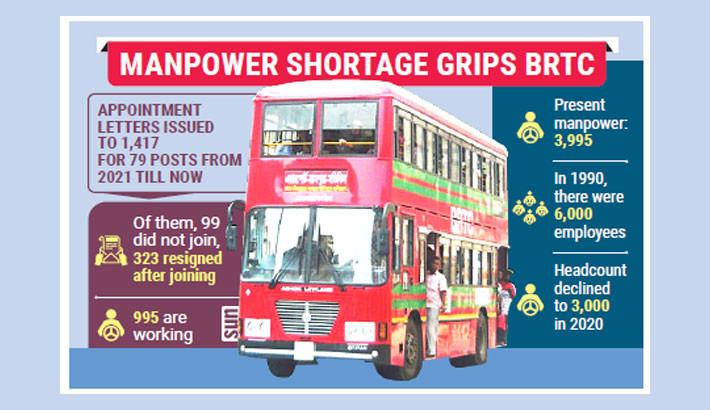Recruitment fails to stem manpower crisis at BRTC
422 appointees leave jobs or fail to join in 4 years

In the past four years, 422 individuals who received appointment letters for various positions at the Bangladesh Road Transport Corporation (BRTC) either did not join or resigned shortly after joining for various reasons, exacerbating the state-owned enterprise's already critical manpower shortage.
According to the BRTC, between February 2021 and January 2025, 1,417 candidates were recruited for 79 positions. Among them, 99 appointees did not join, while 323 left their jobs after joining. Currently, 995 out of 1,417 remain employed.
BRTC sources revealed that many appointees left after securing better opportunities elsewhere. This trend suggests the number of resignations may continue to rise in the future.
While explaining the challenges, Md Tazul Islam, additional secretary and chairman of BRTC, told the Daily Sun, “In 1990, BRTC had 6,000 employees for eight depots, which managed 53 units. By 2021, I found that the workforce for these units had dwindled to just 3,000. We recruited 1,400 people, which brought the current workforce to 4,000. Without these new hires, BRTC would have ceased operations.”
About the reasons behind employee turnover, Tazul Islam emphasised the merit-based recruitment process.
“Our recruitment has been transparent and merit-driven. Many of those recruited were top graduates from institutions like Bangladesh University of Engineering and Technology and Chittagong University of Engineering and Technology. However, these skilled individuals often leave for better opportunities. While this reflects their capability, it also highlights the challenge of retaining talent in a self-funded organisation like BRTC,” he said.
Tohidul Rahman, a former BRTC instructor, explained his decision to leave. “I was appointed as an instructor at BRTC but later joined the 43rd BCS Food Cadre, where I was recommended. The recruitment process at BRTC was highly transparent, and many of us came from top engineering universities,” he said.
Another former employee, Shraboni Akter Iti, who had been appointed computer operator at BRTC, shared her reasons for leaving.
“I joined the office of the Comptroller and Auditor General for the same position because it falls entirely under the revenue budget. Both jobs were merit-based, but the current role offers better long-term prospects,” she said.
BRTC officials highlighted significant improvements in the organisation’s performance over the past four years. Once plagued by corruption and losses, BRTC began its turnaround during the 2021–22 fiscal year. The organisation is now consistently profitable, despite no additions to its fleet of buses and trucks. Revenue has increased 2.5 times during this period.
BRTC currently spends Tk12.5 crore monthly on salaries, compared to Tk6 crore previously. “We are now financially stable and will continue hiring to address manpower shortages,” said Chairman Tazul Islam.
According to officials at various depots, irregularities and corruption within BRTC have largely been eradicated. Pension and gratuity issues that were once common have been resolved, and workshop operations have been upgraded to global standards, reducing repair costs and producing skilled technicians. Training programmes have become a priority, regularly producing qualified drivers. Revenue from truck operations has increased, and buses are now consistently generating profits.


